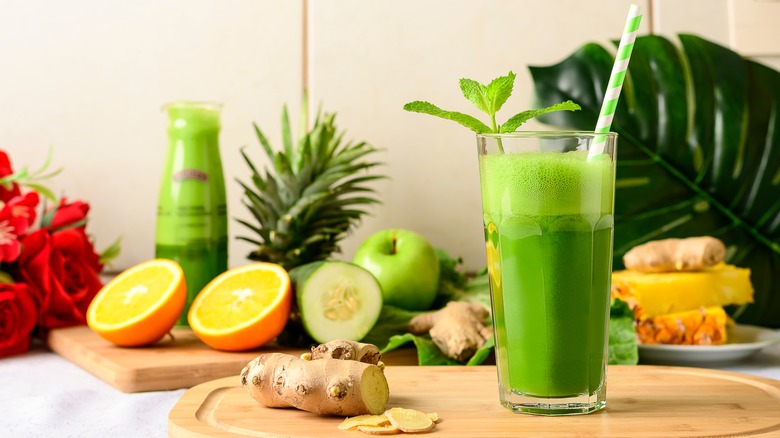Will Detoxing Make You Live Longer?
Master cleanses, juice fasts, and raw food diets are detox techniques that have gained popularity over the years, and sometimes they can be effective for a short while. According to Cleveland Clinic, some purported benefits of detoxing are weight loss, improved bowel movements, headache relief, and an increase in energy. By eliminating certain foods during the process, a detox also can help you identify any food sensitivities. The real gain, however, is the boost in vitamins and minerals your body receives.
On the downside, detox diets are often low in protein and calories, which can cause fatigue and negatively impact your metabolic rate. Moreover, they can put stress on your gastrointestinal system, meaning lots of trips to the bathroom.
The beautiful thing about the human body is that it detoxifies itself. MindBodyGreen says our liver, colon, kidneys, skin, lungs, and lymphatic system are all responsible for removing impurities. It's their job to break down toxins from the air, water, and food we consume, then push them out of the body by way of urine, bowel movements, or sweat. The cleaner you eat, the better your organs will perform — and the better your organs perform, the more likely you are to live a long and healthy life.
How to detox naturally for better digestion
Maintaining a lifestyle that supports your body's natural detoxification process is better for you than going on an extreme detox diet. Function-medicine-trained clinician Deanna Minich told MindBodyGreen that detoxification is vital to whole-body well-being: "If we clear the cellular debris, then the cells can theoretically work better and be more efficient. If the cells are healthy, the tissue will be optimized, which then ultimately supports the entire organism."
Simply eating right helps you detox. Cruciferous vegetables like Brussels sprouts, broccoli, and mustard greens boost detoxification enzymes, according to a 2010 study in the Journal of Food Science. And drinking beetroot juice can help minimize oxidative stress and inflammation in the liver, per a 2015 review in Nutrients. According to a 2014 review in the Journal of Clinical Gastroenterology, coffee, too, is very beneficial for the liver because it increases an antioxidant called glutathione, which helps the body get rid of toxins and regenerate vitamins C and E (per MindBodyGreen).
For a cleaned-out colon, eat high-fiber foods and drink plenty of water (via WebMD). As long as you are gluten tolerant, incorporating whole grains, bran cereal, and oatmeal into your diet is ideal. Increasing your intake of magnesium helps too. Avocados, bananas, dark chocolate, and nonfat or low-fat yogurt are good sources of magnesium (per Everyday Health). Staying hydrated is the best way to help your kidneys do their job, too. The National Kidney Foundation says that for most people, 8 cups of water per day is the goal.
How to detox your skin, lungs, and lymphatic system
Detoxing your skin is all about sweating, Healthline says. A 2016 study in Environmental Science and Pollution Research International showed that vigorous exercise can help your skin sweat out heavy metals in the body. And according to Byrdie, spending an hour in an infrared sauna also is effective for detoxifying the body.
Exercise also helps detox the lungs. Medical News Today says that working out helps your lungs use more oxygen and produce less carbon dioxide. Other ways to cleanse your lungs are practicing steam therapy and consuming anti-inflammatory foods and drinks such as green tea, leafy greens, cherries, blueberries, turmeric, olives, walnuts, beans, and lentils.
According to Chopra, several things you can do to decongest your lymphatic system are staying well hydrated, maintaining good gut health, and eating red foods like pomegranates, cherries, cranberries, and beats. Cleveland Clinic also recommends dry brushing to stimulate lymphatic drainage.



